Key takeaways:
- Culinary networking is about building meaningful relationships that can support one’s career through mentorship and shared experiences.
- Attending culinary events and workshops allows for genuine interactions that can lead to collaborations and new opportunities.
- Leveraging social media platforms can significantly enhance networking by connecting with mentors and industry professionals in creative ways.
- Volunteering and engaging in the culinary community fosters valuable connections and can result in mentorships and professional growth.
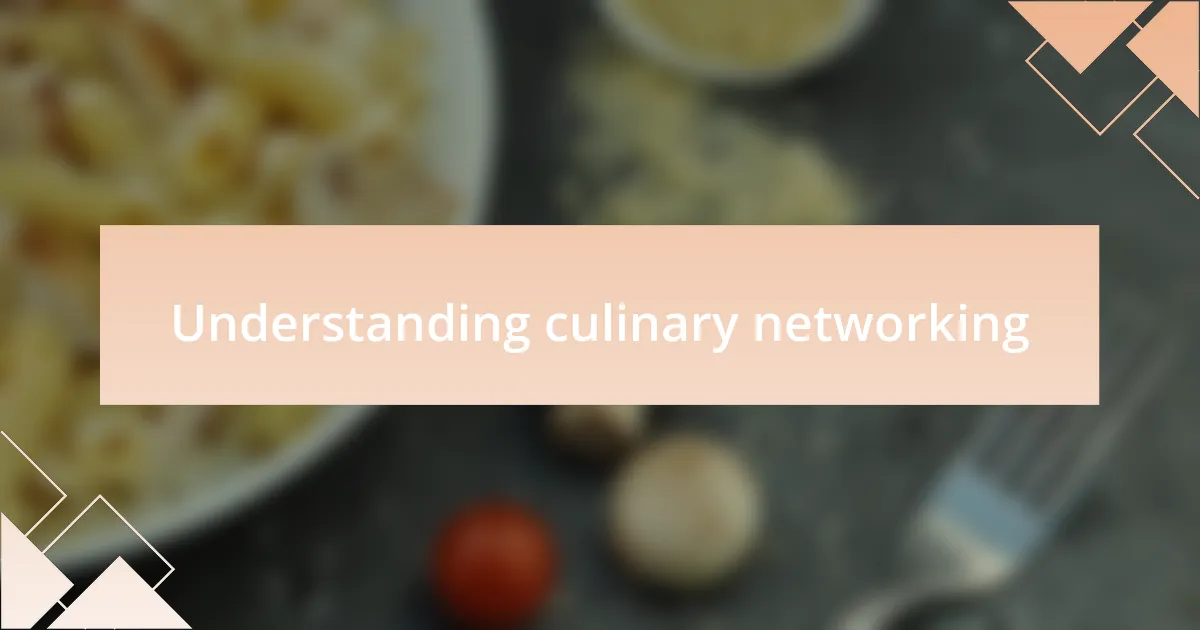
Understanding culinary networking
Culinary networking is more than just exchanging business cards; it’s about building meaningful relationships that can support your journey in the industry. I remember attending my first local food festival, feeling both excited and overwhelmed. It was there that I met a seasoned chef who took the time to share his experiences and insights with me. His willingness to share not only boosted my confidence but also opened doors that I didn’t even know existed.
When I think of culinary networking, I often reflect on the connections I forged in my classes. There was a moment when a fellow student and I decided to collaborate on a project, and it turned into a thriving mentorship. Isn’t it remarkable how a simple conversation can evolve into something more profound? These relationships have often been my lifelines during challenging times in my certification journey.
Moreover, networking in the culinary world is about sharing passions and inspirations. I recall chatting with a pastry chef after a workshop; her enthusiasm was contagious. How often do we let our hearts guide us toward the people who truly resonate with us? Engaging with others opens us up to new ideas and perspectives, enriching our culinary education experience in ways that textbooks simply can’t.
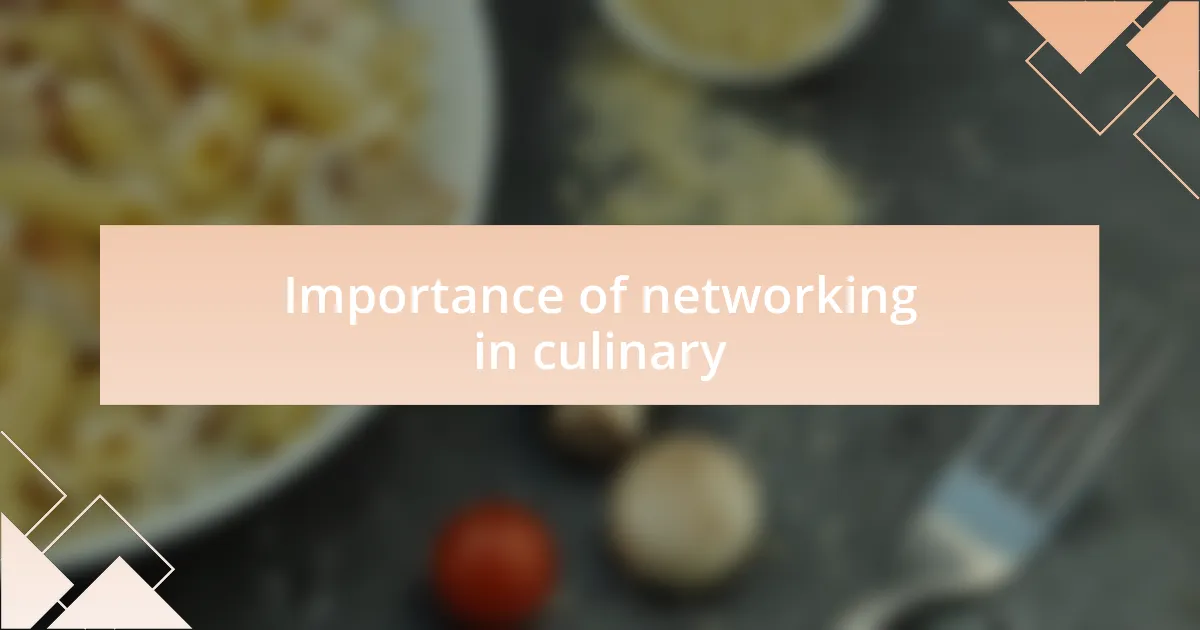
Importance of networking in culinary
Networking in the culinary field holds immense value when it comes to discovering opportunities that might otherwise go unnoticed. I vividly recall a time when I attended a regional chefs’ convention, where I made a casual connection with a restaurant owner. This simple interaction led to an internship that played a crucial role in shaping my career. It makes me wonder: what other opportunities are out there waiting for us, hidden behind a friendly conversation?
Furthermore, building a network not only opens professional doors but also creates a support system that can guide you through the challenging aspects of culinary education. I once found myself struggling with a complicated recipe during a class. It was a fellow student, who I had previously shared a meal with at a local eatery, who stepped in to help. Isn’t it amazing how our networks can transform obstacles into opportunities for learning and collaboration?
Ultimately, culinary networking fosters a sense of community among aspirants and seasoned professionals alike. I remember attending a culinary meetup where participants shared their trials and triumphs. There was a palpable energy in the room as stories exchanged transformed into collective wisdom. Have you ever felt that rush of inspiration when surrounded by passionate individuals? This powerful synergy can elevate our culinary journey and ignite our creativity.
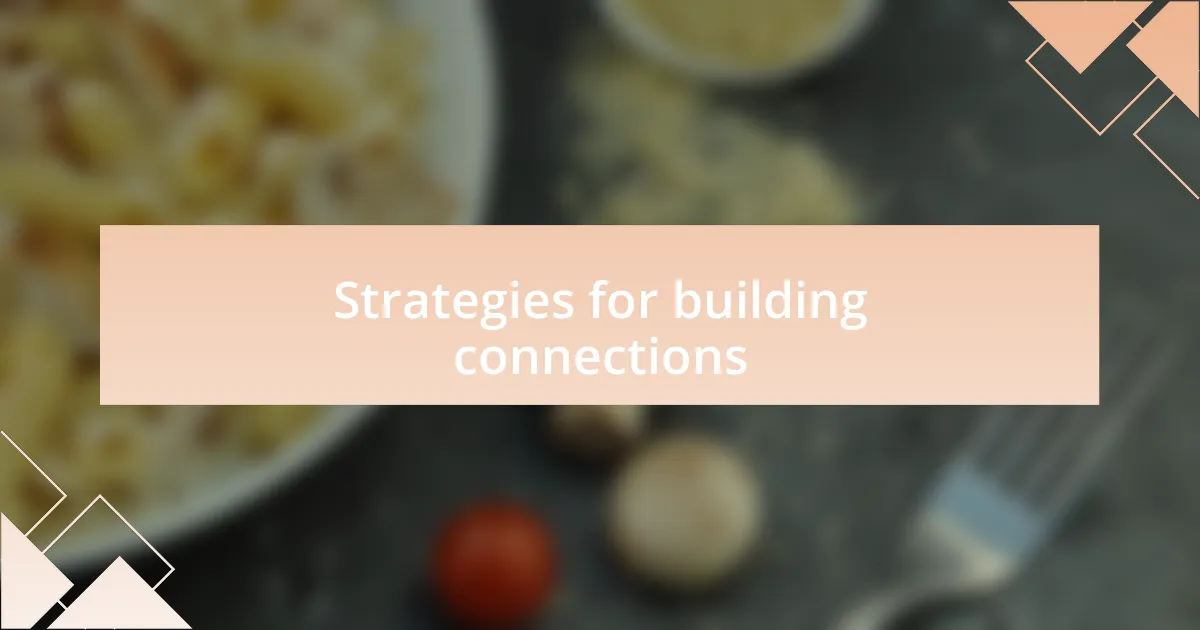
Strategies for building connections
One effective strategy for building connections is to engage actively in culinary workshops and classes. While participating in a hands-on cooking session, I once struck up a conversation with a pastry chef who shared invaluable tips on cake decoration. It’s remarkable how a shared interest in culinary techniques can lead to meaningful exchanges and friendships. Have you ever thought about how these moments of interaction can shape your journey?
Additionally, leveraging social media platforms like Instagram or LinkedIn can be a game-changer. I remember posting a picture of a dish I created, and to my surprise, a well-known chef commented and offered feedback. This not only boosted my confidence but also opened the door to a professional dialogue that expanded my network. Isn’t it fascinating how a single post can connect you with mentors and peers?
Another strategy I found effective is attending local food festivals or culinary events. At one such event, I met a local farmer who shared insights about sourcing fresh ingredients. Our conversation evolved into a collaboration on a farm-to-table dinner event. This experience reminded me how genuine interactions in casual settings can lead to remarkable partnerships. How often do we overlook these opportunities right in our own communities?
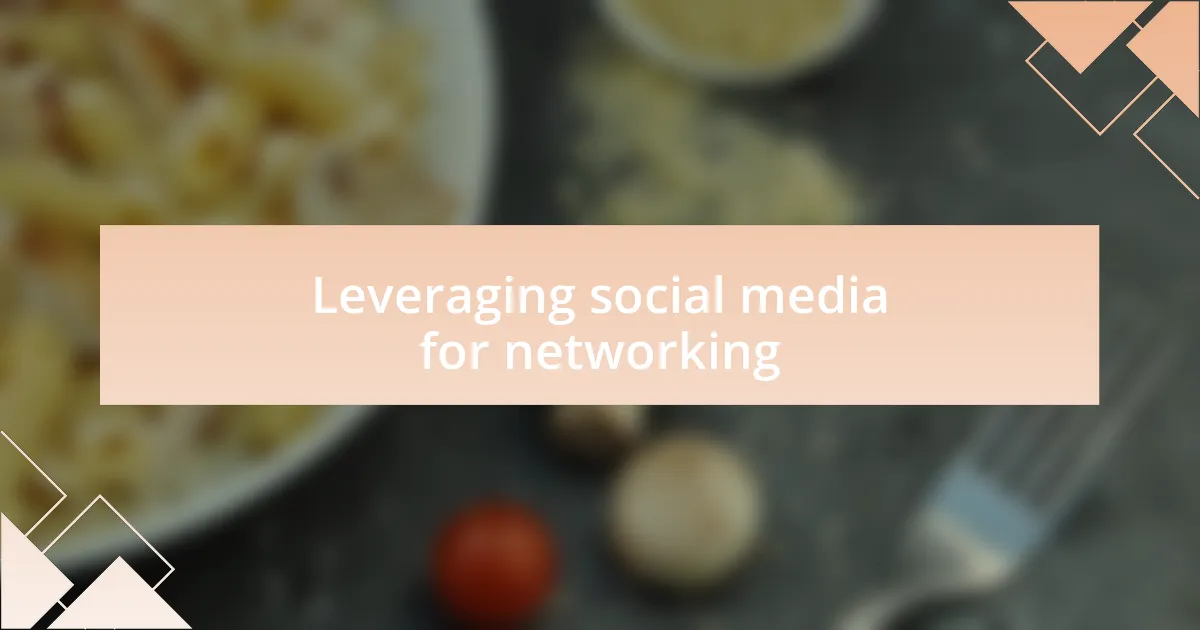
Leveraging social media for networking
Social media has become an essential tool in my networking arsenal. I vividly recall joining a Facebook group focused on culinary education, where I connected with fellow students and seasoned chefs alike. One member reached out to me after noticing a post where I shared my struggles with a particular recipe. His encouragement and advice not only helped me improve but also sparked an ongoing mentoring relationship. Have you ever considered how online communities can provide support that transcends geographical boundaries?
Instagram has been particularly powerful in my journey. Posting photos of my dishes did more than showcase my efforts; it caught the attention of a local culinary influencer. We ended up collaborating on a video project that introduced me to her audience and gave my skills a platform. This experience taught me that authenticity resonates well with people online. Have you thought about how to leverage your unique culinary style to attract peers and mentors through social media?
LinkedIn, on the other hand, provided a more professional avenue for connecting with industry leaders. I remember crafting a personalized message to someone whose work I admired, expressing my genuine appreciation for their contributions to the culinary field. To my delight, this turned into a coffee chat that led to career advice and future networking opportunities. Isn’t it remarkable how a few thoughtful words can bridge the gap between aspiration and opportunity?
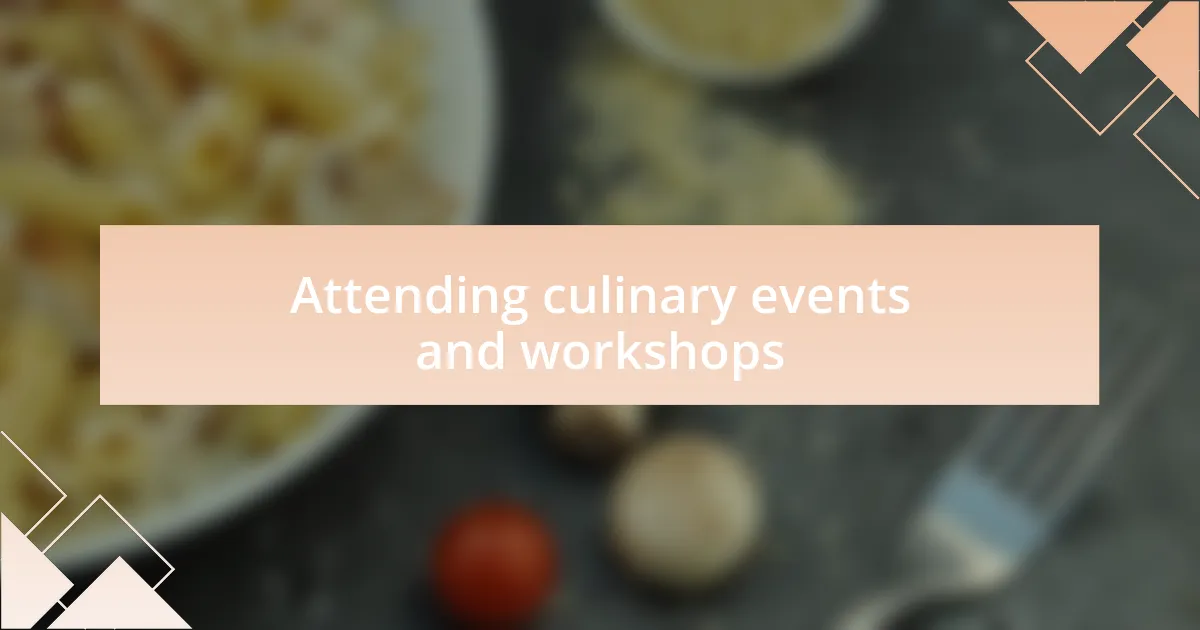
Attending culinary events and workshops
Attending culinary events and workshops has been a game-changer in my networking journey. I remember my first local food festival — the aromas, the buzz of conversation, and the chance to mingle with chefs and food enthusiasts alike. Engaging with others in a hands-on environment made it easier to strike up conversations and share ideas. Have you ever walked away from an event feeling inspired and connected to new friends and mentors?
One memorable workshop I attended focused on contemporary pastry techniques. The chef instructor not only offered invaluable insights but also encouraged us to share our own culinary experiences. It was during this open dialogue that I met a fellow student who now co-hosts pop-up dinners with me. There’s something incredibly motivating about collaborating with someone who shares your passion; it turns your culinary dreams into achievable projects. Have you thought about how sharing knowledge can lead to unexpected partnerships?
I’ve also found that participating in culinary competitions can expand your network dramatically. I recall entering a baking contest where the judges included well-respected chefs. The experience was nerve-wracking, yet exhilarating! Even though I didn’t win, the connections made during those few hours opened doors to internships and job opportunities. Isn’t it fascinating how a single event can set the stage for your career in ways you never imagined?
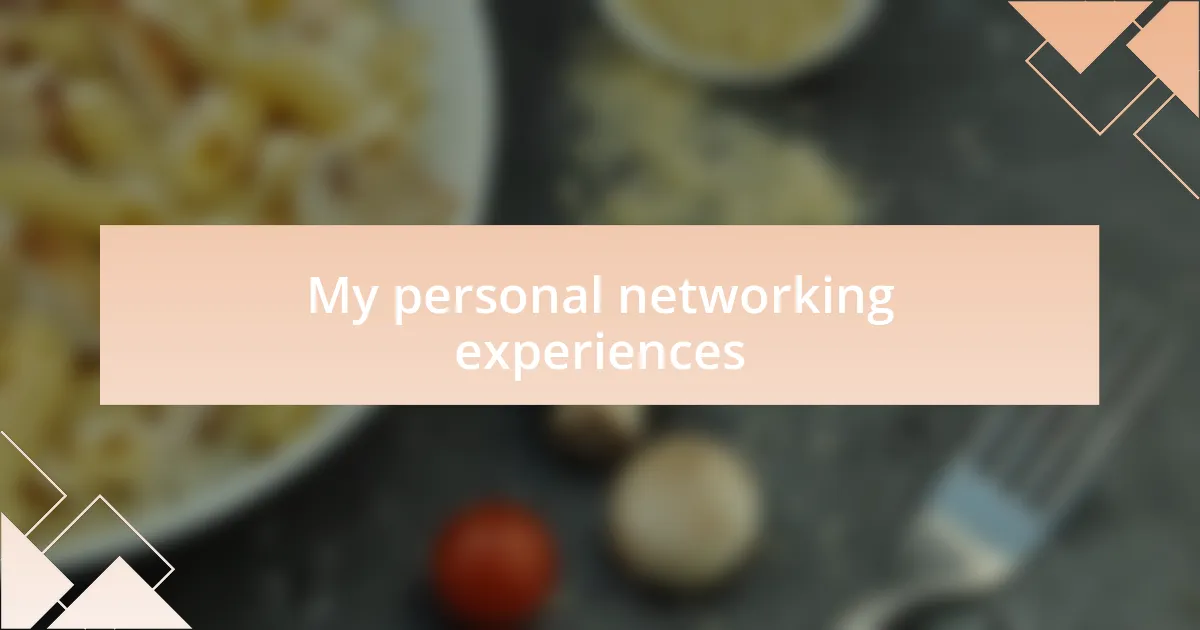
My personal networking experiences
There was a time when I hesitated to reach out to industry professionals, thinking I would only bother them. However, during one particular culinary expo, I mustered the courage to approach a chef I greatly admired. To my surprise, not only did they appreciate my enthusiasm, but they also took the time to share their journey, reinforcing the idea that most chefs are open to connecting with newcomers. Have you ever realized that your admiration could become a bridge to a relationship?
In another instance, I volunteered at a local kitchen that hosted community cooking classes. Working side by side with seasoned chefs and passionate home cooks created a relaxed atmosphere, making it easy to build rapport. I vividly remember the moment one chef invited me to assist in a private event; that one invitation blossomed into a mentorship that provided invaluable lessons beyond the kitchen. Isn’t it intriguing how putting yourself in service can lead to incredible opportunities?
Social media has also play a significant role in my networking journey. I distinctly recall posting about a unique dish I created, and a well-known culinary influencer commented, asking for the recipe. Our online conversation quickly transitioned to a direct message where we discussed potential collaborations. This experience taught me that sometimes, the digital world can amplify real-life connections in ways I hadn’t anticipated. How often do you tap into your online presence to forge connections in your culinary adventures?